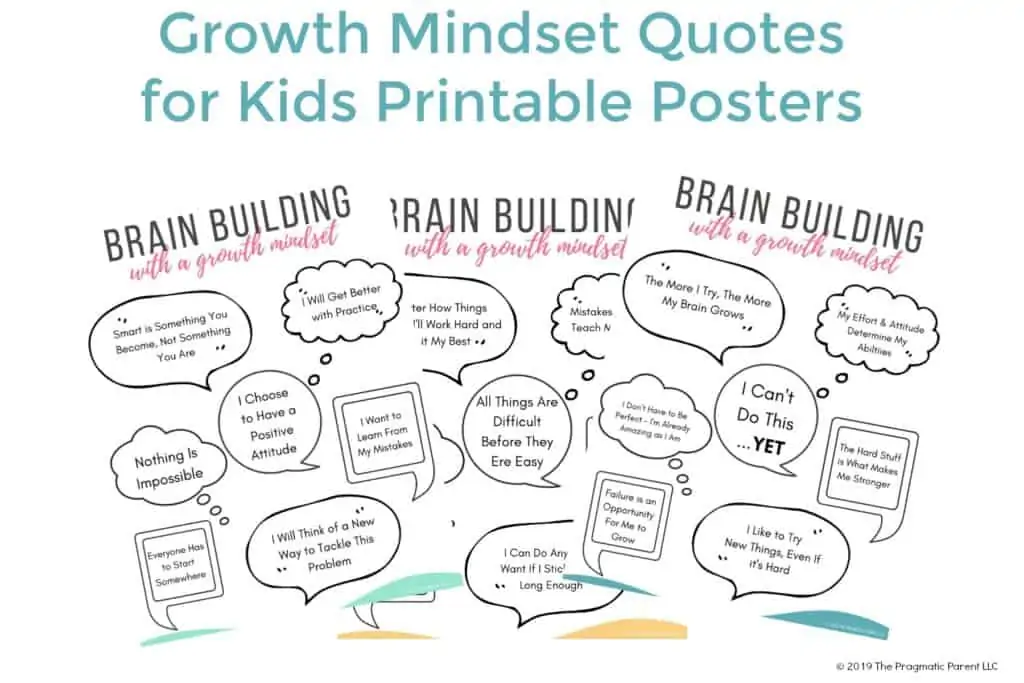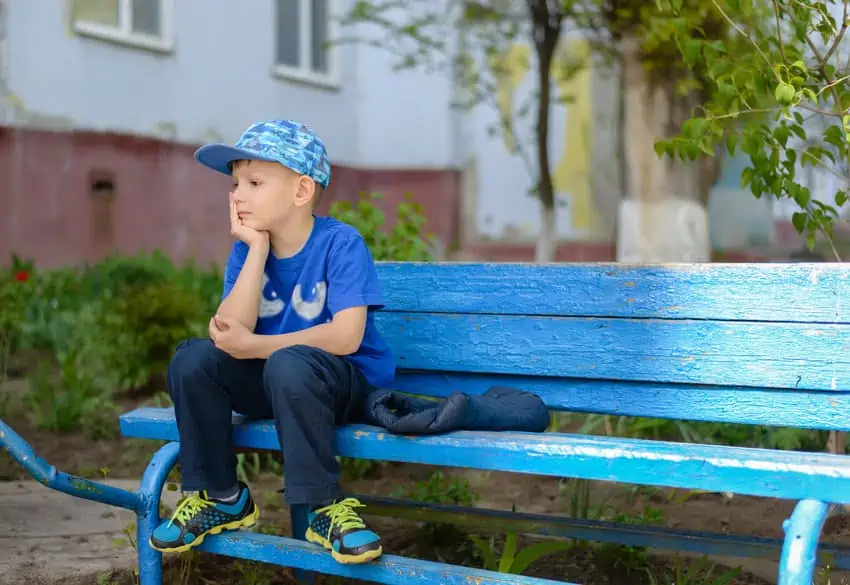Nobody wants to hear their child use negative self-talk language like, “I’m dumb,” “I’m stupid,” or “I’ give up!” As a parent, it breaks your heart but here are some tips to use when responding to your child’s negative self-talk to work towards improved self-esteem and a positive attitude. Check out the Growth Mindset Set for kids, to build confident, resilient, thriving and positively-minded children.

How to Respond to Your Child’s Negative Self Talk
“I don’t know how to do this. I’ve tried but it’s not working. I’m so dumb!” My son threw his pencil down and when I looked over at him, could see the tears sliding down his blazing red cheeks.
He was working on his math worksheets.
I let out a big sigh and mentally braced myself.
Math is not his favorite subject and each week, he has four pages of worksheets due by Friday. We break it up by doing one page each night because he gets easily frustrated and more than one page at a time is guaranteed to start a fit.
Tonight, he’d made it half way through the page before I heard him start to get worked up and then call himself dumb.
“I’m so stupid! Everyone can do math but me. I give up!”
I know schools are teaching math differently now than when I was in elementary school, so I can’t say if it’s the way he’s being taught or he’s having trouble comprehending how to find the answer, but one thing I do know is that he’s not stupid.
He’s not stupid. He’s not dumb. Just frustrated. And feeling like a failure every night we do a page of math.
As I hung my head and put down the wooden spoon I was using to stir the rice, I had the thought – “surely, he doesn’t really think he’s dumb… but what if he does?”
When he says things like this, I want to jump in and help, but these statements I know I can’t simply fix his low self-esteem just by sharing all the things I love about him and telling him he’s wrong.
Objectively Responding to your Child when they want to Quit or Give Up
When your child uses negative self-talk, as parent, your first instinct likely is to jump in and point out all their good qualities and stop the gush of hurtful words.
I know that was my first instinct when Trenton has called himself “dumb” or “stupid” doing math worksheets.
Maybe we try to reassure them, or convince them they’re wrong, but when they’re verbally beating themselves up, the words we use to try to sway them, aren’t going to work.
Here’s why.
In those moments, the words a child chooses to use does match their feelings and perception of themselves, and although that’s a shocking revelation for parents, you can only help once you’ve removed yourself instead of swooping in to love bomb your child.
It’s your job to play detective and instead, identify where those feelings come from, problem solve together and then help your child challenge those thoughts and feelings.
As painful as these things your child may think and feel of themselves is hard to hear, I want to share some ideas to try to address what’s underneath that surface emotion of feeling “dumb,” “stupid,” “worthless,” and “not good.”
Before you jump in to fix things by telling your child how amazing you know they are, it’s critical to take an objective stance and only then can you start to chip away at what’s really underneath the negative self-talk.
(stay with me here, I have a positivity jar toolkit down below to help boost self-esteem and it’s been working like magic in our house!)
My own therapist helped me tackle situations like this with my son, and maybe these steps can help you too. I was surprised at how easy she makes the steps so I know anyone can do them!
-
1) Put Yourself in Their Shoes
Negative self-talk is clear evidence of low self-esteem, and as shocking as it can be to hear it stated out loud, it’s important to remove yourself from the emotions you feel for your child and observe the situation objectively.
Put yourself in your child’s shoes for one moment.
Do you they want you to sprinkle words of encouragement and tell them how “wonderful” and “amazing” they are even though in when they are using negative self-talk these won’t mean much, or do they want you to listen with an empathetic ear so they can get it all out and seek your help?
Playback the situation for your child to show you acknowledge their frustration and are there to listen and help.
For example:
– “That seems like a frustrating math problem, huh?”
– “It looks like that’s a pretty tough skill to master.”
– “I see how hard you’re working to do that but are getting frustrated.”
– “That’s a frustrating assignment. Anything I can do to help?”
-
2) Listen & Acknowledge Their Feelings
What your child is really saying… is a surface emotion. What you see and hear is only the top layer being expressed. You must get to the root of the motion, to evaluate the circumstances empathetically.
For example:
– Is the situation related to the math homework, or feeling less than his peers?
– Is the situation related to feeling stupid, or connected to something else?Searching for what’s triggering the emotions, can help you identify the truth of the situation and what’s actually bothering your child.
Then, you are able to help you child sort out the problem which is separate from their self-worth.
I know my own son has a hard time verbalizing what’s underneath his emotions, and that’s why these emotion picture cards have become a staple in our house because they help him communicate even if it’s just by showing me one of the picture cards or when he can’t find the right words to explain what he’s feeling.
Exploring emotions and the situation together, can help your child not only develop important emotional intelligence, but discover what’s really bugging them.
-
3) Find Out Where Things Got Difficult
Playing detective and asking questions to WHEN the problem started, will help you and your child recognize when something was going well and when it began to get difficult.
For example:
– “What part of your math homework did you get stuck on?”
– “Can you show me where things got hard?”
– “What was the question you didn’t understand?”
– “What part of the day was hard for you?”When you discuss difficult situations like doing math homework, dealing with peer and social situations, athletics and activities, you can ask questions to help you and your child pinpoint where things got hard.
Once you know which parts of the day or work are more difficult than others, you can plan accordingly, but also, it teaches to children that not all of the day, or an entire situation is frustrating – just a part of it.
-
4) Talk About Having a Growth Mindset (And Not a Fixed Mindset)
Once you’ve worked backwards through the entire situation and sorted our feelings, you can test out new phrases to use that encourage a growth mindset, instead of a fixed mindset. Check out the Growth Mindset Set for kids, to build confident, resilient, thriving and positively-minded children.
You can implement daily affirmation cards for kids into your days and give your kids a regular dose of positivity and good mindset.
For example:
– “If I keep working at this, I know I’ll get it.”
– “Making mistakes is all part of learning.”
– “All I can do is try my best.”
– “I’m working hard on my __________.”
– “I don’t understand this, Mom can you help me with this math problem?”
Related: 28 Growth Mindset Quotes to Encourage Kids {Includes 4 Free Growth Mindset Posters}
-
5) Feelings Don’t Define You as a Person
We all have feelings and times when we feel out of our depth, are faced with challenges we don’t know how to work through, and can question our own intelligence, but that doesn’t mean that’s who we are.
Feelings are complex, but don’t define who we are, least of all our character, our abilities, or accomplishments or failures.
Just because your child may feel dumb, stupid, or unloveable doesn’t mean it’s true.
We all struggle with not feeling our best at times, but working hard to overcome a challenge, deal with a difficult situation or even learning how to communicate feelings will make your child feel more confident, resilient and able to distinguish between positive and negative language and self-talk.
Showing your child that a challenge, problem, trouble spot is merely a blip in their day can help them see that the five or ten minutes they’ve spent beating themselves up, is only a tiny fraction of their day and even smaller in the big scheme of things.
What Else Can You Do to Stop Negative Self-Talk?
When you hear your child say bad things about themselves, you may be eager to squash negative self-talk but hearing and accepting reassuring comments from a parent when you’re in a negative frame of mind isn’t always easy.
In fact, some children may shut down those comments quickly, especially if they don’t see themselves in a positive light.
Don’t lose all hope though because there are things you can do to boost self-esteem and stop negative self-talk for good.
1. Use a Positivity Jar to Boost Self-Esteem
-
- A positivity jar is a family note jar for your child, where you drop in positive comments around effort, perseverance, strategy, kindness, and encouragement. You can read the notes around the dinner table once a week or whenever your child needs a shot of positivity.
- Here’s a (free) printable toolkit with all the tools to creating your own positivity jar including labels, notes and ideas.
2. Offer Specific Praise
-
- Praising a child based on their accomplishments, successes, test scores and scored goals doesn’t do them any good. That’s because it’s not specific enough and also because you don’t want a child to believe their worth is tied to these things.
- Instead, praise their effort, hard work, perseverance, determination, drive, skills, strategies, kindness, attitude and abilities. These innate characteristics will be with them forever – the wins, test scores and accolades will not.
- Related: Why You Should Stop Saying Good Job and What to Say Instead
3. Create a Welcoming, Positive Home
-
- Having a safe, positive, welcome home is key to making your children feel safe enough to open up and communicate.
- Parents who are affectionate, hug often, praise efforts, empathize and encourage kids to try new things even with the possibility of failure… are creating a positive home where children feel comfortable and safe to express themselves and come to you when they need to talk or share.
4. Have an Optimistic Mindset
-
- People who have an optimistic mindset have been shown to be more resilient. Modeling an optimistic mindset teaching can be mirrored by children, too.
- People who are optimistic are more likely to rise to a challenge instead of run from it, because they believe that they have the power to learn, grow, and change.
- Using a growth mindset is important to teaching kids to have an optimistic yet realistic attitude. For example, “You don’t know how to read yet, but when you keep practicing, you will.”
5. Look for the Good in Situations
-
- Our brains are actually wired to focus on the bad, and that’s why when hard stuff, tough situations, negative interactions and events occur, we tend to get wrapped up in them. It’s because our brains are wired to protect us for survival. When “threats” occur in our environment, we’re much more in tune to feeling those negative connections.
- As parents, this happens to us too. We tend to focus on the hard parts of parenting or challenges with a child, instead of their strengths. That’s why when bad behavior happens, we notice it! When good things happen, we tend to acknowledge them and our lives continue uninterrupted.
- When we’re mindful of how we react and respond to situations, we can become more aware to not focus on the negative but pay attention to the good events, good behavior and treasured moments more.
- This mindset shift allows you to focus on your child’s strengths and passions, instead of bumps in the road. It also helps you practice daily gratitude for the smallest of things happening in your daily life you otherwise would have missed by being focuses on the bad.
- Children pick up on what behavior you recognize – the good or the bad – and act accordingly. When you focus on the good, you’ll see more good behavior, but you’ll notice they also begin to look for the good around them too.
6. Teach Coping and Calm Down Skills
-
- Having a toolkit to calm down, respond to challenges and keep emotions in check is not innate, it’s learned.
- Calm Down tools are taught but these calm down picture cards put the power in a child’s hands to make the decision about what they want to do to calm down, or redirect their emotions. It teaches them to shift their negative self-talk and emotions towards a healthy response.
- Related: 12 Ways to Calm an Angry Child & The Brain Science Behind Outbursts and Anger Management: Calm Down Tools Kids Can Use Anywhere
Related Positive Parenting Resources:
- 28 Growth Mindset Quotes to Encourage Kids {Includes 4 Free Growth Mindset Posters}
- Stop Power Struggles with Kids & Deal with a Disrespectful Child
- Teaching Feelings & 6 Steps to Help Kids Express Their Emotions
- What’s Your Child’s Love Language? The 5 Love Languages of Kids
- New Ideas to Help You Practice Calm Parenting & Stop Yelling When You Feel Mad
Want even more?
Shop All Parenting Resources
Shop all of our parenting resources from self-regulation tools and managing big emotions to building self esteem and confidence. There are resources for all seasons of life!









